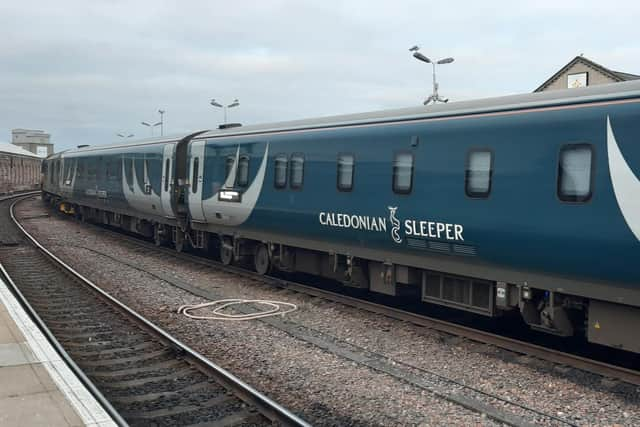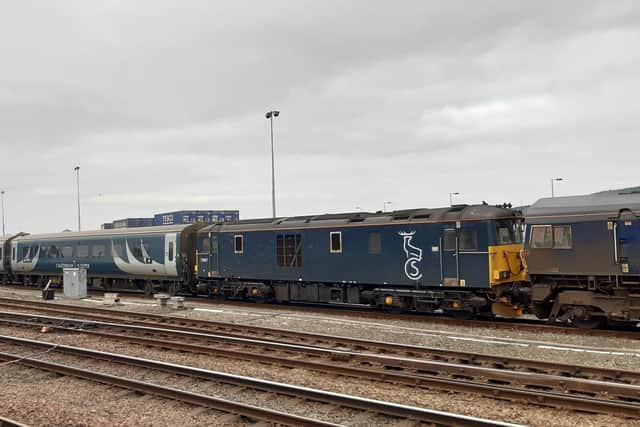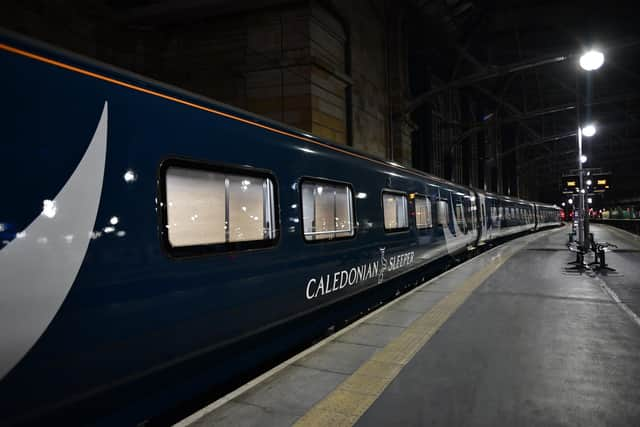Nationalised Caledonian Sleeper ‘may not get the attention it deserves’, SNP warned
Ministers may live to regret nationalising the Caledonian Sleeper because competing Scottish Government priorities threaten to leave the niche service starved of the "energy, incentive and extra resources” needed to maintain high standards aboard the ‘hotel on wheels’," according to Sleeper historian David Meara.
The author’s warning comes days before the Scotland-London overnight trains are taken back into public ownership, 26 years after the end of British Rail.
Advertisement
Hide AdAdvertisement
Hide AdA 15-year contract for Serco to run the Sleeper until 2030 will end seven years early on Saturday after ministers refused to provide extra funding, which the company said was needed to keep it running.


Staff will be transferred on Sunday to a new “arm’s length company” owned and controlled by the Scottish Government under the auspices of Scottish Rail Holdings (SRH), which has also overseen ScotRail since it was nationalised last year. Serco said last week there had been no change to managing director Kathryn Darbandi’s position even though she resigned as a director of Serco Caledonian Sleeper Limited on June 5.
The company has lost some £70 million running the service, with the-then transport minister Jenny Gilruth announcing in October last year its franchise would end in June. It is believed Serco had sought significant extra funding in the face of rising inflation and increasing fuel costs, but Ms Gilruth ruled it was “not best value for money”.
However, Mr Meara said taking the service – which celebrated its 150th anniversary this year – back into the public sector was a mistake. Ministers split it off from ScotRail in 2015 to help it thrive and create a service they said should be “emblematic of Scotland”.
Since then, a new fleet has been introduced for both the “Highlander” service between Aberdeen, Fort William, Inverness and London, and the “Lowlander” between Edinburgh, Glasgow and London. The carriages, which feature en-suite and double rooms, have suffered significant faults, such with their en-suite showers, and electronic glitches, including to door locks, but these appear to have been largely ironed out.


Mr Meara, author of Anglo-Scottish Sleepers, which was published in 2018, told The Scotsman: “I think the Scottish Government have taken a step they may live to regret, because Caledonian Sleeper is a niche service that fits well in the private sector, and may not get the attention it deserves under public ownership.
“Hopefully the experienced team that has been running the service will remain in post, ensuring that all the expertise gained over the past eight years will not be lost. But I wonder whether there will be the energy, incentive and extra resources needed to maintain the high standards that characterise this ‘hotel on wheels’ when it has to take its place in the queue for government funding and attention.
“It is ironic that in the year in which we are celebrating 150 years of Anglo-Scottish Sleepers, the franchise is passing from the private to the public sector. Time will tell whether this creates new opportunities for improvement or is the catalyst for decline."
Advertisement
Hide AdAdvertisement
Hide AdMr Meara said the decision to terminate Serco’s contract came despite the company delivering an “excellent and world-beating service” and had been influenced by “ideological objections from the rail unions”.


The first sleeper carriage ran in 1873, attached to a Glasgow to London Kings Cross train via the east coast main line. The current service operates to and from London Euston via the west coast main line, with the Highlander portions splitting up and joining to form a single train to and from the south in Edinburgh, and the Lowlander at Carstairs in South Lanarkshire.
Scottish Conservatives transport spokesperson Graham Simpson said: “I hope the Caledonian Sleeper continues to perform well, as it has in recent years. The SNP still haven’t said why they think they can run things better or what they intend to do with the service.
"That was exactly the case when they took over ScotRail. It is a case of ideology ahead of service. I look forward to [transport minister] Fiona Hyslop outlining her plans for the service.”


However, Scottish Labour backed the move, but said public ownership of ScotRail had failed to live up to expectations. Transport spokesperson Alex Rowley said: “This is a welcome move and a chance to put passengers before profits on the iconic Caledonian Sleeper.
“The SNP-Green government has so far squandered the opportunities of public ownership with ScotRail, with passengers facing soaring fares and endless disruption. They cannot make the same mistakes again. We need a publicly-owned railway that delivers for passengers and the planet.”
The Rail, Maritime and Transport union, which represents most Sleeper staff, said ministers must commit to sticking to their decision. Scotland organiser Mick Hogg said: "We would appeal to the First Minister to ensure there is no back tracking on this pledge to keep our trains publicly owned and accountable to the people of Scotland.
“As there should be no repeat of the failures of the franchising madness or mismanagement of Scotland’s trains, this is a great opportunity for them to lead by example, similar to [Welsh Government-owned train operator] Transport for Wales.”
Advertisement
Hide AdAdvertisement
Hide AdA Transport Scotland spokesperson said: “Since the pandemic, ministers have taken full financial responsibility for the Caledonian Sleeper over the past three years, supporting and investing in all efforts to further develop the product, and helping the team deliver the service’s most successful years on record.
“The Sleeper has surpassed every other train service in the UK in recovering from the pandemic and is now thriving. This is testament to the quality and attractiveness of a service that continues to exceed passenger satisfaction targets and the hard work of dedicated staff who provide a world-class service for those onboard.
“The Caledonian Sleeper is an iconic rail service and we are putting strong governance arrangements in place to ensure a stable platform for the service to continue to grow, as well as providing certainty for passengers and staff.”
Comments
Want to join the conversation? Please or to comment on this article.